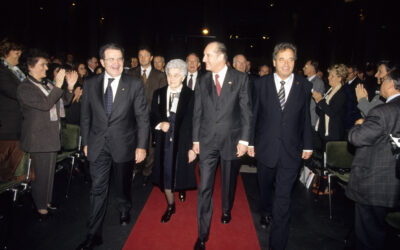 The Indian subcontinent has more than a billion, 170 million inhabitants. Its population could soon exceed China’s. It is a rapidly developing country with one of the biggest economies in the world. At the same time there is tremendous illiteracy, poverty and malnutrition. Its enormous religious variety includes the 80% Hindu majority and a 2.3% Christian minority. It is understandable that among the Focolare dialogues in process in this land, the most developed should be in the interreligious field, especially with Hindus. The Focolare Movement has been in India since 1980. Today there are centres in Mumbai, Bangalore, Goa, New Delhi which promote various activities: Mariapolises, monthly meetings for adults, families, and young people. In various cities – Vasai, Pune, Panaji, Margao, Vasco, Trichy – there are groups actively following the Focolare spirit. Various small social projects are flourishing around the Focolare communities. These are engaged in educating children, improving conditions for women, supporting families in difficulty, with support also being given from people in other places. The best know are ‘Ilanthalir’ (Tamil for tender shoots) in the South of India and in Mumbai ‘Udisha’ – the sun ray that announces the new dawn. Set up to ‘offer a practical response to the poverty around us’ they now look after about 2400 children and their families. There is a particular emphasis upon spreading the values of universal fraternity in the world of adolescents, reaching out to young people of all religions with various events, included ones of an international nature.
The Indian subcontinent has more than a billion, 170 million inhabitants. Its population could soon exceed China’s. It is a rapidly developing country with one of the biggest economies in the world. At the same time there is tremendous illiteracy, poverty and malnutrition. Its enormous religious variety includes the 80% Hindu majority and a 2.3% Christian minority. It is understandable that among the Focolare dialogues in process in this land, the most developed should be in the interreligious field, especially with Hindus. The Focolare Movement has been in India since 1980. Today there are centres in Mumbai, Bangalore, Goa, New Delhi which promote various activities: Mariapolises, monthly meetings for adults, families, and young people. In various cities – Vasai, Pune, Panaji, Margao, Vasco, Trichy – there are groups actively following the Focolare spirit. Various small social projects are flourishing around the Focolare communities. These are engaged in educating children, improving conditions for women, supporting families in difficulty, with support also being given from people in other places. The best know are ‘Ilanthalir’ (Tamil for tender shoots) in the South of India and in Mumbai ‘Udisha’ – the sun ray that announces the new dawn. Set up to ‘offer a practical response to the poverty around us’ they now look after about 2400 children and their families. There is a particular emphasis upon spreading the values of universal fraternity in the world of adolescents, reaching out to young people of all religions with various events, included ones of an international nature.  The 2009 Supercongress – a meeting run by Youth for Unity – was held in Coimbatore, drawing together teenagers from across the planet. Many small but significant concrete ventures were also spoken of in the recent New Humanity meeting in Mumbai (September 2011). Among the participants was a doctor from Goa who had set up the mobile Prabhu Prasad Clinic offering various medical services for people of all ages. Chiara Lubich visited India two times, especially for dialogue with her Hindu brothers and sisters. This was after she had got to know Dr Aram, the founder of Shanti Ashram, at the World Conference of Religions for Peace. In 2001 in Coimbatore (Tamil Nadu) she received the ‘Defender of Peace’ prize from the Shanti Ashram together with the Sarvodaya Movement. She came back in 2003 to the Mumbai’s Somaiya Vidyavihar College. She had been asked to speak about her particular vision of unity and universal fraternity, which she did. After that there have been numerous discussion meetings, conferences, exchange visits and symposia – the last being in December 2011. These were all occasions of dialogue, steps ahead in building relationships of real fraternity with the Hindu world, as witnessed, for instance, by Dr Vijaya Bhatia, a yoga teacher, who spoke at the Fourth Hindu-Chrisian Symposium on the theme: ‘Reading, interpreting and living the Scriptures to being about peace and universal brotherhood’.
The 2009 Supercongress – a meeting run by Youth for Unity – was held in Coimbatore, drawing together teenagers from across the planet. Many small but significant concrete ventures were also spoken of in the recent New Humanity meeting in Mumbai (September 2011). Among the participants was a doctor from Goa who had set up the mobile Prabhu Prasad Clinic offering various medical services for people of all ages. Chiara Lubich visited India two times, especially for dialogue with her Hindu brothers and sisters. This was after she had got to know Dr Aram, the founder of Shanti Ashram, at the World Conference of Religions for Peace. In 2001 in Coimbatore (Tamil Nadu) she received the ‘Defender of Peace’ prize from the Shanti Ashram together with the Sarvodaya Movement. She came back in 2003 to the Mumbai’s Somaiya Vidyavihar College. She had been asked to speak about her particular vision of unity and universal fraternity, which she did. After that there have been numerous discussion meetings, conferences, exchange visits and symposia – the last being in December 2011. These were all occasions of dialogue, steps ahead in building relationships of real fraternity with the Hindu world, as witnessed, for instance, by Dr Vijaya Bhatia, a yoga teacher, who spoke at the Fourth Hindu-Chrisian Symposium on the theme: ‘Reading, interpreting and living the Scriptures to being about peace and universal brotherhood’.  It is an ideal for life made concrete in the day to day, as in the case of one young woman from Mumbai who chose to give someone in greater need than her the money she had struggled to raise to pay a very high medical bill. It was a huge surprise when that very evening she received a phone call from the hospital. They had discovered an error in her favour and they owed her 300 rupees! It is the experience of living the Gospel that has an effect not only in the private and personal sphere, but also in the social. Statistics can be frightening, but striving the be ‘the change you would like to see in the world’, as Gandhi taught, the seeds of fraternity can continue to grow.
It is an ideal for life made concrete in the day to day, as in the case of one young woman from Mumbai who chose to give someone in greater need than her the money she had struggled to raise to pay a very high medical bill. It was a huge surprise when that very evening she received a phone call from the hospital. They had discovered an error in her favour and they owed her 300 rupees! It is the experience of living the Gospel that has an effect not only in the private and personal sphere, but also in the social. Statistics can be frightening, but striving the be ‘the change you would like to see in the world’, as Gandhi taught, the seeds of fraternity can continue to grow.
Love unites
Love unites




0 Comments